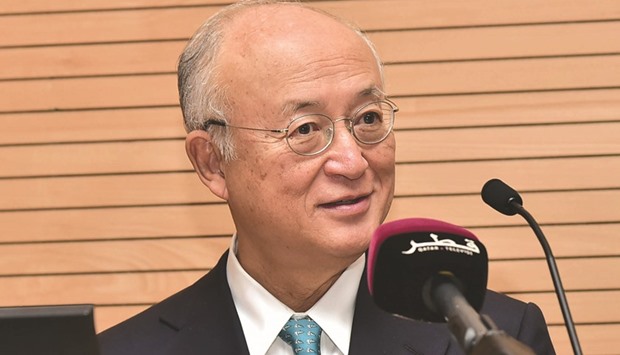Yukiya Amano, Director General of the International Atomic Energy Agency (IAEA), has hailed Qatar’s efforts in support of the IAEA and its mission for world peace.
The IAEA director general, who gave a lecture yesterday at Qatar University (QU), said that Qatar has been an IAEA member since 1970s and has been supporting the efforts of the agency and its mission for international peace.
Organised in collaboration between QU and the National Committee for the Prohibition of Weapons (NCPW), the lecture focused on four key areas: Iranian nuclear programme, main points of the deal, points of concern, and impact of the deal on the region and the world.
Amano gave an overview of IAEA’s role and strategy, and outlined details of the Agency’s nuclear technology and applications.
The IAEA director general highlighted the agency’s ongoing efforts since 2003 to ensure that Iran is committed to fulfil its obligations as an NPT state party. He added that a movement started in 2013.
“This was concluded by the P5+1 Nuclear Agreement (Deal) with Iran. This agreement assures the peaceful nature of Iran nuclear programme. Last year the IAEA signed a roadmap with Iran to draw the Iranian nuclear dimensions.”
Amano said: “IAEA is the world’s central intergovernmental forum for scientific and technical co-operation in the nuclear field. It works for the safe, secure and peaceful uses of nuclear science and technology, contributing to international peace and security.”
He also stressed on the importance of “nuclear medicine technologies” – a cutting-edge-technology to solve various contemporary issues related to medicine, agriculture and climate by using nuclear technology.
He said: “Nuclear techniques play a pivotal role in addressing needs related to the prevention, diagnosis and treatment of health conditions, in particular non-communicable diseases such as cancer and cardiovascular diseases. They can also help monitor and address malnutrition in all its forms, from undernutrition to obesity. Many countries have started to use nuclear medicine technology to cure cancer and other fatal diseases.”
QU Chief Strategy and Development Officer Dr Darwish al-Emadi said: “This event comes as a result of a memorandum of understanding signed in 2015 between QU and NCPW to increase students’ awareness on issues relating to international conventions on the prohibition of weapons of mass destruction through organising training sessions and awareness workshops on relevant key issues.”

Yukiya Amano, Director General of IAEA, delivering a lecture at Qatar University.
